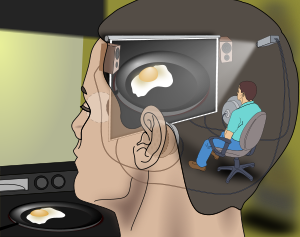
In philosophy of mind, Cartesian materialism is the idea that at some place (or places) in the brain, there is some set of information that directly corresponds to our conscious experience. Contrary to its name, Cartesian materialism is not a view that was held by or formulated by René Descartes, who subscribed rather to a form of substance dualism.
In its simplest version, Cartesian materialism might predict, for example, that there is a specific place in the brain which would be a coherent representation of everything we are consciously experiencing in a given moment: what we're seeing, what we're hearing, what we're smelling, and indeed, everything of which we are consciously aware. In essence, Cartesian materialism claims that, somewhere in our brain, there is a Cartesian theater where a hypothetical observer could somehow "find" the content of conscious experience moment by moment. In contrast, anything occurring outside of this "privileged neural media" is nonconscious.